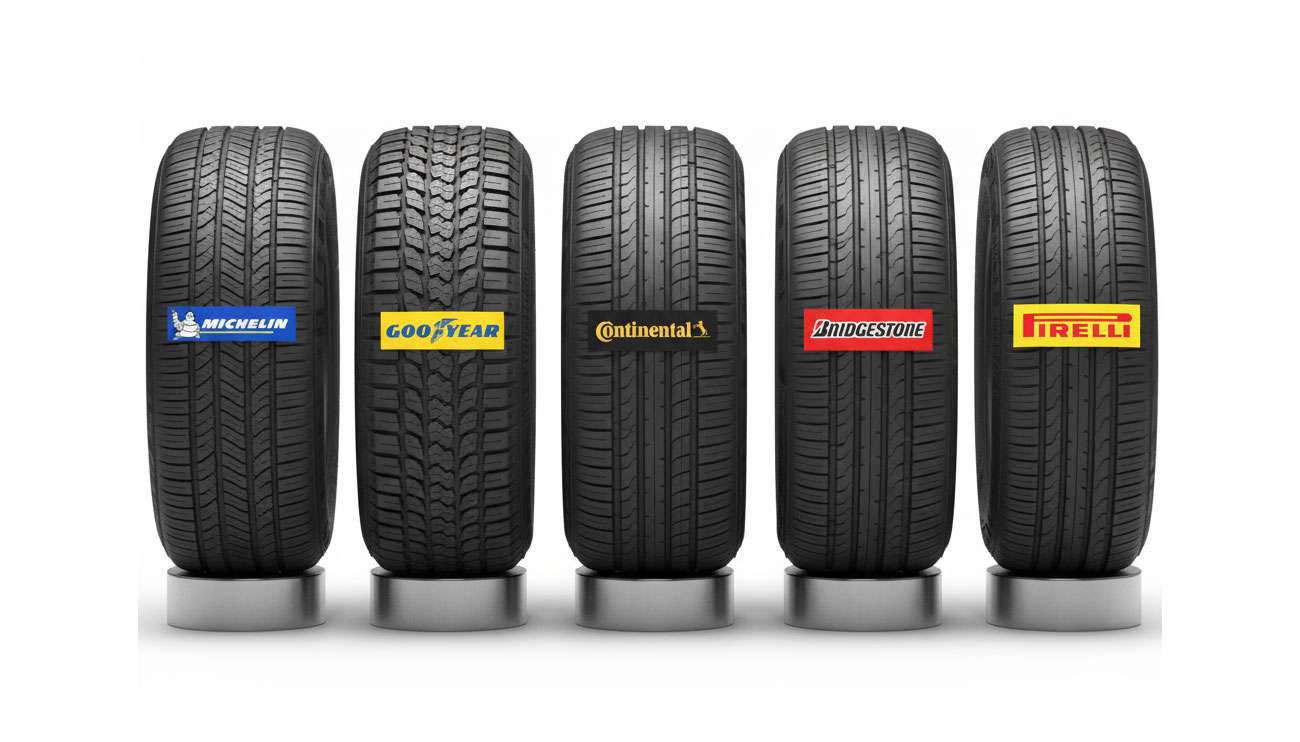
Selecting the best tire brand comes down to matching quality, performance, and price to your specific driving needs. We carry the best selection of premium tire brands at the lowest prices, and our expertise helps you find the perfect match for your vehicle.
Michelin leads the tire industry with over 100 years of innovation and eco-friendly tire development. The Michelin CrossClimate2 ranks high on reliability lists, delivering unmatched wet performance and year-round versatility. Goodyear, the world's largest tire manufacturer, maintains its household name status through superior handling in both dry and wet conditions. Continental brings German engineering excellence dating back to 1871, while Bridgestone earned recognition for developing revolutionary rayon cord tires. Pirelli stands out as Italy's premier performance tire brand, with their Cinturato WeatherActive topping dry performance tests.
The top tire brand for your vehicle depends entirely on how you drive, where you drive, the vehicle you own, and your budget. Quality tires come with reasonable warranties covering time, treadlife, and mileage considerations. We'll examine what makes each of these top tire brands unique and help you determine which offers the best value for your specific driving needs.
Our expert team is ready to guide you through the selection process, ensuring you get both style and functionality at prices that won't break the bank.
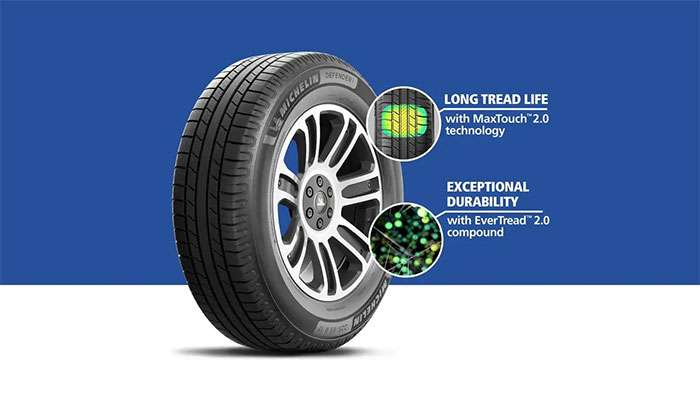
Image Source: Michelin Tires
Michelin has built its reputation as a tire industry leader through continuous innovation since 1889. Founded in France, this global manufacturer delivers exceptional performance across multiple vehicle categories through advanced engineering and quality construction.
Understanding Michelin's technology helps explain their industry position. The company maintains over 10,000 active patents supported by more than 6,000 R&D specialists working across 350 fields of expertise. This extensive research foundation creates tires with superior characteristics that consistently outperform competitors.
Michelin's EverGrip innovation ensures better traction even as the tire wears down. Their specialized tread patterns optimize grip in both dry and wet conditions while minimizing road noise and rolling resistance. The CrossClimate technology represents a breakthrough in all-season performance, earning the 3-Peak Mountain Snowflake certification for winter use while maintaining impressive summer capabilities.
Tire construction focuses on durability without sacrificing comfort. Their casing technologies are specifically engineered for long-lasting performance, reducing the need for frequent replacements. Advanced sidewall protection features shield tires from curb damage and abrasions, particularly beneficial for urban driving conditions.
Sustainability drives Michelin's future direction. Their "All sustainable approach" targets 100% sustainable tire products by 2030. This environmental consciousness extends to their e.Primacy All Season tires, designed to maximize fuel efficiency and range for conventional and electric vehicles alike.
Pros:
Exceptional longevity: Approximately 70% of Michelin users report their tires exceed mileage warranties, with some Defender models lasting beyond 90,000 miles.
Superior safety performance: The tires provide excellent wet and dry braking capabilities, reducing stopping distances on slippery surfaces.
Comfortable ride quality: Over 60% of drivers praise Michelin's ability to deliver a smooth and quiet ride, especially at highway speeds.
Fuel efficiency: Low rolling resistance designs help reduce fuel consumption, saving money at the pump.
Versatile all-weather performance: About 75% of reviewers expressed confidence in Michelin tires across diverse weather conditions.
Cons:
Premium pricing: The primary drawback noted by about 25% of reviewers is Michelin's higher cost compared to other brands.
Performance degradation: Some users report that while tread life is excellent, performance can slightly decline toward the end of the tire's lifespan.
Limited specialty options: Despite extensive offerings, Michelin has fewer dedicated off-road models compared to some competitors.
Over 80% of reviewers ultimately agree that Michelin tires' durability, performance, and comfort justify their premium price. The long-term savings from fewer replacements and better fuel efficiency often make them a cost-effective choice for many drivers.
Michelin tires command higher prices than many competing brands, reflecting their premium quality and advanced technology. Prices vary significantly based on tire model, size, and intended use:
Entry-level options start around $91-$130 per tire
Mid-range models generally fall between $160-$300 per tire
Premium performance tires range from $300-$550 per tire
Specialty and large-size tires can reach $600-$1300+ per tire
The Michelin X-Ice Snow winter tires begin at $121.70 per tire, while the high-performance Michelin Pilot Alpin PA5 starts at $330.68. The popular Defender LTX M/S starts around $241.57 per tire, and the Michelin Agilis CrossClimate is available from $221.99 per tire.
Many retailers offer financing options to make these premium tires more accessible. A set of four tires can be financed starting from $5.00 per week for the X-Ice Snow model or $13.00 per week for the Pilot Alpin PA5.
Michelin creates specialized tires for various driving needs and vehicle types. Their extensive catalog includes options optimized for specific conditions and driving styles:
Daily Commuters and Family Vehicles: The Michelin Defender2 earns high marks with a 4.6/5 rating from 758 reviews. Its exceptional durability and all-season capabilities make it ideal for drivers seeking long-lasting performance without frequent replacements.
All-Weather Performance: The CrossClimate2 stands out with an impressive 4.8/5 rating from 4,588 reviews. As the first all-season tire to earn the 3-Peak Mountain Snowflake certification, it delivers balanced performance across summer and winter conditions with an impressive 85,000-mile lifespan.
SUVs and Light Trucks: The Defender LTX M/S series provides excellent stability and durability for vehicles that tow or haul. With 4.5/5 stars from 353 reviews, it offers superior highway stability and wet-weather performance. Its robust construction makes it particularly suitable for heavier vehicles and long-distance travel.
Performance Vehicles: The Michelin Pilot Sport 4 S earns an outstanding 4.8/5 rating from 1,936 reviews. Developed in partnership with racing sports car manufacturers, these tires deliver exceptional handling, responsiveness, and grip for high-performance vehicles.
Electric Vehicles: Michelin's e.Primacy All Season tires are specifically designed to maximize battery range through reduced rolling resistance while maintaining excellent performance credentials, earning a perfect 5/5 rating.
Winter Driving: For severe winter conditions, the X-Ice Snow provides superior grip on snow and ice, rated 4.7/5 by 404 users. It offers outstanding mobility and safety in harsh winter environments with superior ice traction compared to competing winter tires.
Michelin continues to set industry standards for tire performance, safety, and innovation across virtually all vehicle categories and driving conditions.
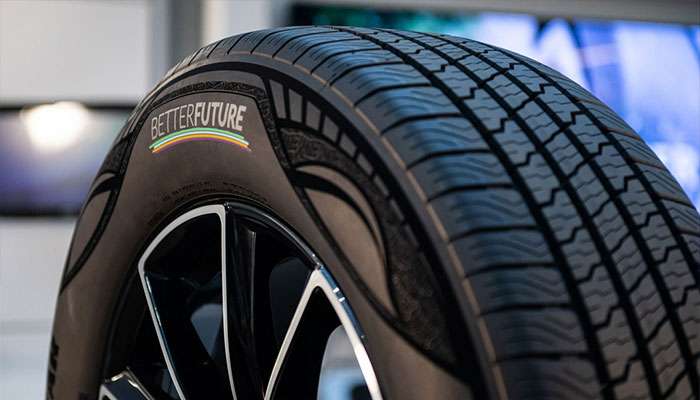
Image Source: Newsroom | Goodyear Corporate
Goodyear has built its household name status through more than a century of tire innovation. Founded in 1898 in Akron, Ohio, this American manufacturer operates 55 facilities across 22 countries with approximately 71,000 employees. Understanding Goodyear's strengths helps you determine if their tires match your driving needs.
Innovation drives Goodyear's reputation in the tire industry. The company introduced the first tubeless tire in 1903, pioneered all-season tires in 1977, and developed run-flat technology in 1992. These breakthrough advancements continue today through proprietary technologies that deliver real performance benefits.
The DuPont™ Kevlar® technology provides enhanced strength and puncture resistance, particularly valuable in off-road applications. The Wrangler All-Terrain Adventure w/Kevlar incorporates this material to resist sidewall punctures during challenging off-road conditions.
All-weather performance sets Goodyear apart through models like the Assurance WeatherReady, which maintains grip even as tread wears down. Their winter tire lineup includes the WinterCommand, featuring compounds that stay flexible in frigid temperatures.
Customer assurance programs add value to your purchase. The 30-Day Pledge allows you to test select tires for a month before deciding whether to keep them. Goodyear also offers an Online Purchase Guarantee and Price Match Guarantee, refunding 100% of price differences found within 14 days.
For commercial applications, Goodyear's subscription-based "tires-as-a-service" program combines premium tires with predictive maintenance insights. Pilot testing reduced emergency breakdown events by nearly 80% for last-mile delivery fleets.
Pros:
Proven durability: Creates tires that resist road hazards and deliver extended tread life
Smooth, quiet ride: Delivers excellent ride quality across rough surfaces
Strong warranty coverage: Treadwear warranties range from 45,000 to 85,000 miles
Advanced technologies: Features like SoundComfort Technology reduce noise while ActiveBraking enhances control
Extensive selection: Covers virtually all vehicle types from commuters to performance cars and off-road trucks
Cons:
Higher pricing: Some models cost more than budget alternatives
Recent price adjustments: 2023 price increases up to 4% on select consumer products due to rising costs
Variable service experiences: Some customers report warranty claim handling issues
Goodyear's tire pricing reflects their diverse product lineup across different performance categories:
All-season commuter tires: $65-$130 per tire for entry-level options like the Assurance® All-Season
Premium all-season models: $130-$225 per tire including the Assurance ComfortDrive®
Performance tires: $140-$350+ for models like the Eagle F1 Supercar
All-terrain/off-road tires: $150-$400 including the Wrangler DuraTrac
Winter tires: $90-$200 for models such as the WinterCommand
Mileage warranties provide additional value, with coverage spanning 45,000 miles for performance models up to 85,000 miles for premium commuter tires like the Assurance MaxLife®2.
Goodyear excels in specific applications based on their tire technologies and construction:
Daily commuters: The Assurance lineup, especially the ComfortDrive® model, offers an ideal balance of comfort, longevity, and all-weather performance with 60,000-mile warranty coverage. Quiet ride technology and fuel efficiency make these perfect for regular highway driving.
Electric vehicles: The ElectricDrive™ 2 series focuses on low rolling resistance to maximize battery range while maintaining grip and handling capabilities.
SUVs and light trucks: The Wrangler lineup delivers versatility for varied driving conditions. The TrailRunner AT provides smooth on-road comfort while handling mild off-road terrain, making it suitable for SUV owners who occasionally venture off pavement.
Off-road enthusiasts: The Wrangler DuraTrac handles rugged terrain through reinforced sidewalls and aggressive tread patterns. This tire performs well in both off-road challenges and winter conditions.
Performance vehicles: The Eagle F1 Supercar delivers outstanding dry-road grip through ultra-high-performance compounds and asymmetric design that enhances cornering stability.
Fleet operations: Goodyear's Tire Optix mobile management and subscription services help commercial fleets minimize downtime. European testing showed their subscription service reduced emergency breakdowns by nearly 50% while lowering fuel consumption up to 4%.
When considering which tire brand offers the best long-term value, Goodyear's century-plus innovation history, combined with strong warranty coverage and diverse product offerings, makes it a solid contender across numerous driving applications.
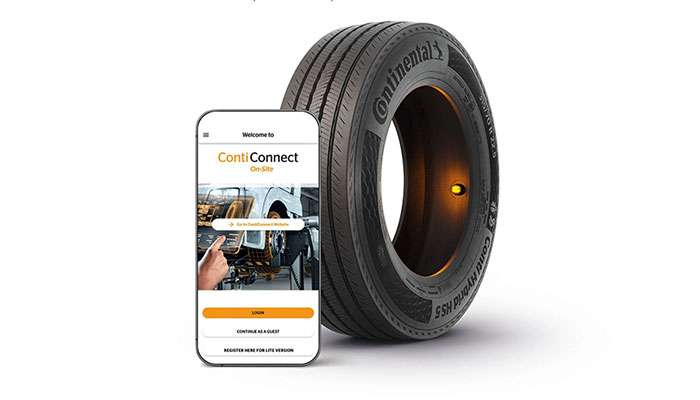
Image Source: Continental Tires
Continental brings German engineering excellence to tire manufacturing since 1871. This heritage brand combines precision engineering with advanced innovation to create tires that deliver exceptional safety, performance, and durability across diverse driving conditions.
Continental's reputation stems from relentless focus on technological advancement. Their EcoPlus Technology significantly reduces rolling resistance, leading to improved fuel efficiency without compromising performance. This innovation proves particularly valuable for drivers seeking to maximize their vehicle's range while reducing fuel consumption.
SportPlus Technology powers their ExtremeContact line, delivering responsive handling, enhanced wet surface grip, and extended tread life. The ExtremeContact DWS06 Plus provides superior performance in dry, wet, and snowy conditions, making it a versatile choice for year-round use.
Continental's ContiSilent technology reduces road noise by up to 9 dB(A). This polyurethane foam layer inside the tire absorbs sound waves, creating a quieter cabin environment regardless of road surface or weather conditions.
Safety defines Continental's design philosophy. Their run-flat technology (SSR System) allows drivers to continue for up to 80 km at 80 km/h after a puncture, eliminating immediate roadside stops. The ContiSeal technology automatically seals punctures up to 5 mm in diameter, addressing 80% of potential flat tire situations without driver intervention.
Continental's specialized tire lineup includes:
ExtremeContact DWS06 Plus for all-season ultra-high performance
ExtremeContact Sport02 for dynamic street and track performance
TrueContact Tour offering extended tread life through specialized compound and symmetrical design
Pros:
Outstanding all-weather performance: Continental tires demonstrate exceptional grip across various weather conditions
Advanced tread engineering: Specialized patterns ensure smooth, quiet rides on different surfaces
Innovative safety technologies: ContiSeal and run-flat capabilities provide genuine peace of mind
Fuel efficiency benefits: EcoPlus Technology reduces consumption and extends vehicle range
German engineering standards: Rigorous quality assessments ensure consistent performance
Cons:
Premium pricing structure: Continental tires typically cost more than budget alternatives
Limited size availability: Some specific tire sizes may be difficult to locate
Durability inconsistencies: Some customers report tires failing before expected lifespan
Warranty claim concerns: Customer complaints exist about warranty processes
Continental positions itself in the premium market segment, with pricing reflecting advanced technology and German quality engineering:
All-season commuter options: Starting from $65-$130 per tire
Premium all-season models: $130-$225 per tire
Performance tire range: $140-$400+ per tire
Winter and specialty tires: $150-$450+ per tire
Most Continental models include treadwear warranties, though customer warranty experiences vary. Continental's pricing philosophy reflects their value proposition: "We believe that our pricing reflects the value we provide to our customers".
Continental excels in specific applications where their German engineering and innovative technologies deliver maximum value:
Performance driving enthusiasts: The ExtremeContact Sport02 provides superior dry and wet handling with excellent braking performance. Professional driving schools including ROUSH Performance, BMW Performance Driving School, and AMG Driving Academy prefer these tires for track-proven capabilities.
Year-round reliability seekers: The TrueContact Tour delivers exceptional tread life and balanced performance across varying conditions, perfect for drivers wanting dependable year-round performance without frequent tire changes.
Comfort and quiet priority drivers: Models featuring ContiSilent technology provide remarkably quiet and smooth rides, ideal for those prioritizing cabin comfort during daily commutes or long-distance travel.
Safety-focused vehicle owners: Continental's self-sealing tires and run-flat technology offer peace of mind for drivers concerned about unexpected tire failures and roadside emergencies.
Luxury vehicle applications: The PremiumContact 7 with adaptive pattern technology ensures precise handling on both wet and dry roads, delivering premium driving experiences that complement high-end vehicles.
Environmentally conscious drivers: The UltraContact NXT features exceptional recycled and renewable materials with triple A EU label ratings for rolling resistance, wet braking, and noise reduction.
Continental stands as a strong contender when determining which tire brand offers the best combination of engineering excellence, innovative safety features, and refined performance across diverse driving conditions.
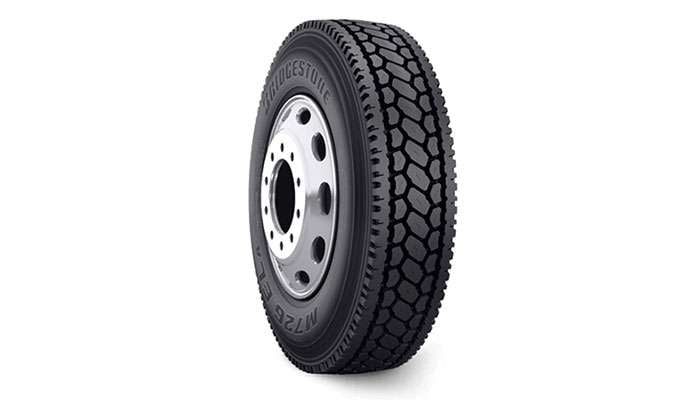
Image Source: Equipment Supply of Cincinnati
The world's largest tire manufacturer, Bridgestone has built an impressive reputation since its founding in Japan in 1931. The company's name reflects its innovative spirit—"Ishibashi" means "stone bridge" in Japanese, with the founder reversing the syllables to create a globally recognizable brand spanning 24 countries with extensive production facilities.
Bridgestone's technological advancement drives its industry leadership position. The company maintains an impressive portfolio of innovations, including their revolutionary Run-Flat technology that allows drivers to continue for up to 50 miles at speeds up to 50 mph after a puncture. This eliminates the need for immediate roadside stops, enhancing both safety and convenience.
The brand focuses on specialized tread compounds and patterns designed for specific driving conditions. Their WeatherPeak tires deliver outstanding all-season performance with exceptional wet and dry traction even in extreme weather conditions. Advanced rubber compounds improve year-round performance balance without sacrificing safety or handling.
Bridgestone's sustainability commitment represents another core feature, with initiatives like their "Airless Concept Tires" aiming to create sustainable materials in a "cradle-to-cradle" system where all tires are recycled and refashioned into new ones. This aligns with their environmental vision for a sustainable future where recycled tires become the standard.
Their diverse product portfolio includes specialized lines for various applications:
Potenza: High-performance tires for sports cars and performance vehicles
Turanza: Comfort-focused touring tires with reduced road noise
Dueler: Truck and SUV tires designed for durability on tough terrain
Blizzak: Winter tires with exceptional snow and ice traction
Ecopia: Fuel-efficient options with low rolling resistance
Pros:
Exceptional toughness and durability across diverse road conditions
Outstanding performance for high-performance vehicles with models earning 9-10 ratings for dry traction
Advanced safety features including innovative Run-Flat capabilities
Quiet, comfortable ride with many customers rating ride comfort 9-10
Fuel-saving compounds that reduce environmental impact
Wide compatibility with various vehicle types from sedans to commercial trucks
Cons:
Higher prices compared to budget tire alternatives
Limited options for extreme off-road conditions
Some all-season models offer subpar winter performance
Potentially confusing product lineup with numerous variations (28 different tires under the Potenza name alone)
Bridgestone positions itself in the premium market segment, with prices reflecting their technological advantages and quality manufacturing:
Entry-level commuter tires typically range from $65-$150 per tire
Mid-range all-season options usually fall between $130-$250 per tire
Premium performance models like the Potenza Sport can cost $140-$400+ per tire
Specialty winter tires such as the Blizzak series range from $120-$350 per tire
Most Bridgestone tires come with comprehensive warranty coverage, including their 90-Day Buy & Try Guarantee that allows customers to exchange tires if not fully satisfied.
Bridgestone's product lineup excels in several key applications:
Luxury vehicle owners: The Alenza AS Ultra and Turanza Prestige lines deliver elegant comfort with inspiring performance, making them ideal for luxury SUVs and sedans.
Performance enthusiasts: The Potenza Sport receives exceptional ratings for cornering stability (9.0/10) and dry traction (9.0/10), making it perfect for sports cars and performance-oriented drivers.
All-weather reliability: The WeatherPeak tire offers confident all-weather protection with outstanding grip on wet, dry, and snowy roads, ideal for drivers in variable climate regions.
Electric vehicles: The Turanza EV provides tailored performance for electric vehicles, optimizing range efficiency without compromising handling.
Commercial fleet operators: The Duravis lineup, including the R500 HD, is specifically engineered for the demands of commercial highway driving and heavy-duty applications.
We offer competitive pricing on Bridgestone's full tire lineup, ensuring you get the performance and reliability you need at prices that fit your budget.
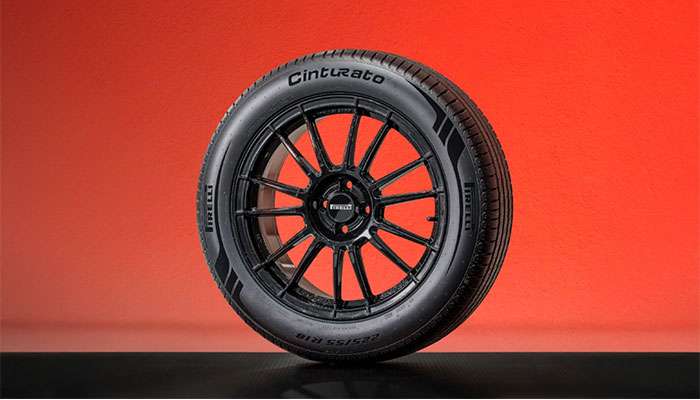
Image Source: Pirelli
Pirelli stands as Italy's premier performance tire manufacturer since 1872, earning its reputation through motorsports excellence and high-performance applications. As the fifth largest tire manufacturer globally, Pirelli supplies original equipment for luxury and performance vehicles where superior handling matters most.
Pirelli's innovative technologies deliver measurable performance advantages for discerning drivers. The Pirelli Noise Canceling System™ uses polyurethane foam inside the tire to reduce cabin noise by up to 2-3 decibels—essentially cutting perceived noise in half. This technology creates a remarkably quiet ride that enhances comfort on long journeys.
Safety-conscious drivers appreciate Pirelli's dual puncture protection systems. The Seal Inside™ technology automatically seals penetrating objects with specialized mastic, maintaining air pressure throughout the tire's lifespan. The Pirelli Run Flat technology features reinforced sidewalls that support your vehicle for 50 miles at 50mph after a puncture, eliminating dangerous roadside stops.
Pirelli leads tire innovation with their Cyber™ Tire system—the first sensor-based technology that communicates real-time tire data directly to your vehicle. For electric vehicle owners, ELECT™ tires increase driving range by up to 10% through reduced rolling resistance while handling high torque and minimizing road noise.
The legendary P Zero showcases Pirelli's performance heritage with its asymmetrical tread pattern that delivers superior braking, handling, and wet-weather safety. This flagship model earned an 'A' rating on the European wet grip label from launch, proving its exceptional wet-weather capabilities.
Pros:
Exceptional handling and traction at high speeds
Superior wet performance with excellent hydroplaning resistance
Advanced noise reduction creates remarkably quiet rides
Specialized electric vehicle options extend driving range
Motorsport heritage ensures proven performance design
Cons:
Premium pricing reflects advanced technology and performance
Some performance models show faster wear rates
Winter performance limited on snow-covered roads
Focus on luxury and performance applications over budget options
Pirelli positions itself in the premium performance segment with pricing that reflects advanced engineering:
Entry-level commuter tires: $65-$150 per tire
Premium all-season models: $130-$225 per tire
High-performance options: $150-$400+ per tire
Specialty models: $200-$500+ per tire
The Cinturato P7 All Season Plus includes a 50,000-mile treadwear warranty, providing excellent long-term value for the initial investment.
Our experience shows Pirelli excels in specific driving applications where performance matters:
Performance vehicles: The P Zero family delivers exceptional handling, traction, and high-speed stability for sports cars and luxury sedans. Track enthusiasts particularly value the P Zero Trofeo RS for its proven performance capabilities.
Luxury SUVs: The Scorpion lineup provides outstanding on-road comfort with capable off-road performance. The Scorpion Zero offers balanced capabilities for luxury SUVs that occasionally venture off pavement.
Electric vehicles: Pirelli's ELECT™ technology specifically addresses EV requirements through reduced rolling resistance, high torque handling, and noise reduction features.
Wet weather driving: Pirelli models consistently earn excellent wet performance ratings, with exceptional hydroplaning resistance that builds driver confidence.
Comfort-focused drivers: Models featuring the Noise Canceling System deliver notably quieter rides, reducing fatigue during commutes and long-distance travel.
When performance and handling are priorities, Pirelli's motorsport heritage and advanced technologies justify the premium investment through superior driving experience and safety.
When choosing between these top tire brands, the key differences become clear when you compare their technologies, pricing, and ideal applications. We've compiled this comparison to help you make the right decision for your vehicle and driving needs.
| Brand | Key Technologies | Price Range (Per Tire) | Notable Strengths | Primary Limitations | Best Suited For |
|---|---|---|---|---|---|
| Michelin | - EverGrip Technology - CrossClimate Technology - Advanced Sidewall Protection |
$91 - $1,300+ | - Exceptional longevity - Superior safety performance - Excellent fuel efficiency |
- Premium pricing - Performance degradation near end of life - Limited specialty options |
- Daily commuters - All-weather driving - Electric vehicles - Performance vehicles |
| Goodyear | - DuPont™ Kevlar® Technology - SoundComfort Technology - ActiveBraking |
$65 - $400+ | - Proven durability - Smooth, quiet ride - Comprehensive warranty |
- Recent price increases - Inconsistent customer service - Premium pricing |
- Daily commuters - Electric vehicles - Off-road enthusiasts - Fleet operations |
| Continental | - EcoPlus Technology - ContiSilent Technology - ContiSeal Technology |
$65 - $450+ | - Exceptional all-weather performance - Advanced safety features - Fuel efficiency |
- Premium pricing - Limited availability - Inconsistent durability |
- Performance enthusiasts - Comfort-focused drivers - Luxury vehicle owners - Safety-conscious drivers |
| Bridgestone | - Run-Flat Technology - WeatherPeak Technology - Airless Concept Technology |
$65 - $400+ | - Exceptional toughness - Outstanding performance - Quiet, comfortable ride |
- Higher prices - Limited off-road options - Confusing product lineup |
- Luxury vehicle owners - Performance enthusiasts - Electric vehicles - Commercial fleets |
| Pirelli | - Noise Canceling System - Seal Inside Technology - Cyber™ Tire System |
$65 - $500+ | - Exceptional handling - Superior wet performance - Advanced noise reduction |
- Premium pricing - Faster wear rates - Limited snow performance |
- Performance vehicles - Luxury SUVs - Electric vehicles - Wet condition driving |
This comparison shows how each brand targets different driving needs and budgets. The right choice depends on balancing these factors against your specific requirements and vehicle type.
The best tire brand for your vehicle comes down to matching your specific driving requirements with each manufacturer's strengths. Our extensive review reveals that each brand excels in different areas - Michelin for longevity and safety, Goodyear for durability and warranty coverage, Continental for engineering precision, Bridgestone for luxury applications, and Pirelli for performance handling.
Your priorities determine the right choice. Safety-conscious drivers benefit from Continental's ContiSeal technology or Michelin's superior braking capabilities. Performance enthusiasts should consider Pirelli's P Zero lineup or Bridgestone's Potenza series. Variable weather conditions call for Michelin's CrossClimate technology or Goodyear's WeatherReady options.
Quality extends beyond brand names. Tread pattern design, rubber compound formulation, and construction methods create the real performance differences. Michelin tires deliver exceptional balance of quality, performance, and longevity, making the premium pricing worthwhile for many drivers.
Proper maintenance matters regardless of brand selection. Regular rotation, alignment checks, and correct tire pressure extend tire life significantly. These basic practices often provide more value than brand switching alone.
Ready to find your perfect tires? Visit Performance Plus Tire today and let our knowledgeable staff guide you through the selection process. We offer competitive pricing on all major brands with financing options available. Whether you're looking for daily commuter reliability or high-performance capabilities, we have the best selection at prices that fit your budget.
The best tire brand isn't universally defined - it's the one that best serves your specific needs, driving conditions, and budget. Make an informed choice and drive with confidence for thousands of miles ahead.
When choosing the best tire brand, success depends on matching your specific driving needs, vehicle type, and budget to each manufacturer's unique strengths.
Michelin leads in longevity and safety - Offers exceptional tread life (70% exceed warranty mileage) and superior wet/dry braking, justifying premium pricing through long-term value.
Brand specialization matters more than reputation - Goodyear excels in durability and fleet operations, Continental dominates comfort and all-weather performance, Bridgestone leads in luxury applications, and Pirelli specializes in high-performance handling.
Technology drives real performance differences - Features like Michelin's EverGrip, Continental's ContiSeal puncture protection, and Pirelli's Noise Canceling System deliver measurable benefits beyond basic transportation.
Price reflects long-term value, not just upfront cost - Premium brands ($130-$400+ per tire) often provide better fuel efficiency, longer tread life, and enhanced safety features that offset higher initial investment.
Proper maintenance maximizes any brand's performance - Regular rotation, alignment checks, and correct tire pressure extend tire life regardless of manufacturer, making maintenance as important as brand selection.
The "best" tire brand isn't universal—it's the one that best matches your driving conditions, performance requirements, and budget constraints for optimal safety and value.
When selecting a tire brand, consider your specific driving needs, vehicle type, local climate, and budget. Top brands like Michelin, Goodyear, Continental, Bridgestone, and Pirelli offer different strengths in areas like longevity, performance, comfort, and all-weather capability.
Premium brands often justify their higher prices through superior technology, longer tread life, better performance, and enhanced safety features. While more expensive upfront, they can provide better value over time through improved fuel efficiency and less frequent replacements.
All-season tires offer year-round versatility but may not perform optimally in extreme winter conditions. Dedicated winter tires provide superior traction and handling in snow and ice. For areas with severe winters, using seasonal tire sets is often recommended for optimal safety and performance.
Each brand has its strengths: Michelin is known for longevity and fuel efficiency, Goodyear for durability and innovation, Continental for comfort and safety technology, Bridgestone for performance and eco-friendly options, and Pirelli for high-performance and luxury vehicle fitments.
Tire replacement frequency depends on factors like driving habits, road conditions, and tire quality. Generally, tires should be replaced every 6-10 years or when the tread depth reaches 2/32 of an inch. Regular inspections and rotations can help extend tire life and maintain performance.